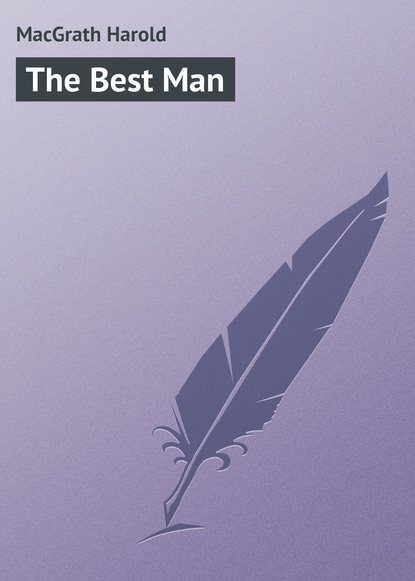По всем вопросам обращайтесь на: info@litportal.ru
(©) 2003-2024.
✖
The Best Man
Настройки чтения
Размер шрифта
Высота строк
Поля
"You are not playing up to your form to-day, John," she observed.
"I admit it," he replied, tossing his club to the caddy, who, well versed in worldly affairs, serenely shouldered the bag and made off toward the club house. "My heart isn't in the game, Kate. The fact is, I'm in a peck of trouble." He determined to tell her at once. There might not be another opportunity like this.
"Why, John!" reproachfully.
"Oh, it came only yesterday. I haven't been hiding it. I'm in a kind of pocket, and can't exactly see my way out. I want your advice; and you must be the jury and judge rolled into one."
They were standing on a hill, and far away they could see the pale line where the shimmering summer sea met the turquoise bowl of heaven.
"Tell me what your difficulty is, John, and I will judge it the best I know how."
He never knew what a simple, beautiful name John was till it fell from the lips of this girl. Many called him Jack; but only his mother and this girl called him John. He motioned toward the sandbox, and they sat down. The other players were well scattered about, out of hearing. He made out his case skilfully enough, giving his plaintiff and defendant fictitious names. The thing grew so real to him, as he went on, that toward the end he rose to the dramatics. The girl listened, but with never a glance at him. Rather her gaze roved over the dancing gray waters and followed the lonely white sail that stood out to sea. And when he reached the climax, silence of some duration fell upon them.
"Should this man be punished?" he asked at length.
"He is guilty; he has broken two laws, the civic and human. Oh, the poor people!" pathetically. "They are never at peace; the wolf harries them, and the jackal; they are robbed, beaten and spurned. They are like sheep, not knowing how to fight. They arrest a man for his poverty; they applaud him for his greed. It is all very wrong."
The sail fell under the shadow of a cloud, and they both watched it till it flashed into the sunlight again.
"A woman's intuition is sometimes abnormally keen. You are strong enough to fight such things without the advice of a woman. Is there not something vital to me in all this? Is it not … is it not my father, John?"
II
CARRINGTON faced her swiftly. He had not expected this. There was something in her handsome eyes that barred the way to subterfuge. The lie died unspoken, and he dropped his gaze and began to dig up the turf with the toe of his shoe.
"Is it my father, John?"
"Yes. Oh, Kate," with a despairing gesture, "I'm the most miserable fellow alive! To think that this should fall into my hands, of all hands in the world!"
"Perhaps it is better so," quietly. "Nothing is without purpose. It might have come to test your honesty. But you are sure, John; it is not guess-work?"
"All the evidence is in my pocket. Say the word, and the wind shall carry it down to the sea. Say the word, heart o' mine!"
He made a quick movement toward his pocket, but she caught his arm.
"Do nothing foolish or hasty, John. Tearing up the evidence would not undo what is done. Sooner or later murder will out. If my father is culpable, if in his thoughtless greed for money he has robbed the poor, he must be made to restore what he has taken. I know my father; what he has done appears perfectly legitimate to him. Can he be put in prison?"
"It all depends upon how well he defends himself," evasively.
She went on. "I have been dreading something like this; so it is no great surprise to me. He is money-mad, money-mad; and he hears, sees, thinks nothing but money. But it hurts, John; I am a proud woman. My grandfather…" Her lips shut suddenly. "Money!" with a passionate wave of the hand. "How I hate the name of it, the sound of it, the thought of it! I love my father," with a defiant pride; "he has always been tender and kind to me; and I should not be of his flesh and blood had I not the desire to shield and protect him."
"The remedy is simple and close at hand," suggested Carrington gently.
"Simple, but worthy of neither of us. I abhor anything that is not wholly honest. It is one of those strange freaks of nature (who holds herself accountable to no one) to give to me honesty that is the sum total of what should have been evenly distributed among my ancestors. If I were to tell all I know, all I have kept locked in my heart…"
"Don't do it, girl; it wouldn't matter in the least. You are you; and that is all there is to love. Why, I could not love you less if your great-great-grandfather was a pirate," lightly. "Love asks no questions; and ancestors worry me not at all; they are all comfortably dead."
"Not always. But if my perception of honor were less keen, I should laugh at what you call your evidence."
"Laugh?"
"Yes, indeed. I very well understand the tremendous power of money."
"Not more than I," sadly.
She laughed brokenly. "More than you. I can picture to you just what will happen." She rose. "There will, of course, be a great newspaper clamor; the interstate commissioners will put their heads together; there will be investigations by the government. That will be the attack. The keenest lawyers are on the side of corporations; that is because the state is niggard with her pay. Let me outline the defense. Father will resign from his high office, to be reëlected later when the public cools off! A new directorate will fill the place of the present one. Suddenly falsified entries will be discovered; the head bookkeeper will have disappeared. All fingers will point to him. He will be in South America, having been paid several thousand to go there. All this will make the passing of the dividend perfectly logical. The matter will never be tried in court. Money will do all this."
"My dear little woman, you reason like Pythagoras; but," Carrington added gravely, "when I undertook to untangle this affair, I realized its huge proportions. For every redoubt your father has, I have an assault, for every wall a catapult, for every gate a petard. But, as I said before, you have only to say the word, and for the present nobody will be any the wiser."
"If I permitted you to do this, I should destroy my faith in both of us. It would erect a barrier which would be insurmountable. That is not the way out."
"I have weighed all these things," discouragedly.
He took the document from his pocket and caught it in a way that indicated how easily it might be ripped into halves, the halves into quarters, the quarters into infinitesimal squares of meaningless letters.
"Once more, shall I, Kate?"
"No, John. That would only make our difficulties greater. But I do ask this one favor; put your evidence into the hands of a strange attorney, have nothing to do with the prosecution; for my sake."
"I must have the night to think it over. Most of my attacks are not herein written; I dared keep them only in my head."
"I am very unhappy," said the girl.
He took her hand and kissed it reverently. He longed to console her, but no words he had in mind seemed adequate.
"Fore!" came lazily over the knoll. They were no longer alone. So together they wandered slowly back to the club-house. Tea was being served, and Carrington drank his abstractedly. From time to time he joined the conversation, but without any heart. Some of the busier ladies whispered that it looked this time as though Kate had given the young man his congé.
On the way home Norah, with her humorous comment on the weekly budget of gossip, saved the situation from any possible contretemps. Mrs. Cavenaugh was easy-going, but for all that she possessed remarkably observant eyes; and her eldest daughter was glad that they were occupied elsewhere.
Kate was very unhappy; her father was not honest, and the man she loved had come into the knowledge of the fact. Ah, how quickly shadow can darken sunshine!
"What did you make it in to-day, Mr. Carrington?" asked Norah.
"Make what?" he counter-questioned absently.
"The course, Mr. Goose! What did you think I meant?"
"Oh," lamely, "I made a bad play at the beginning, and gave it up."
By this time they had arrived at the gates, and everybody was thankful; Mrs. Cavenaugh, because her nose smarted with sunburn; Norah, because the gown she was to wear at the dance that night was new; Kate, because she wanted to be alone; and Carrington, because he wanted to learn whether the Angel threw Jacob or Jacob threw the Angel. The driver and the horses were glad to arrive because they were hungry.
It took the young lawyer some time to dress for dinner that night. His usually direct mind vacillated between right and wrong, wrong and right; and he floated from one to the other like an unattached cork. He made a dozen annoying blunders in dressing. And when finally the pier-glass reflected an irreproachable and finished picture, he searched his cast-off vest for his growing monster and transferred it to the pocket of his coat. Monster! Here was no story-monster, like the creature of a Frankenstein; it was genuine, and was like to turn upon him at any moment and rend him. He shrugged and proceeded down the stairs. There are soliloquies that sometimes leave an unpleasant taste behind. So he pinned his faith to the banner of the late genial and hopeful Micawber: something might turn up for the benefit of all concerned.
The hall and living-room at the Cavenaugh manor were one and the same. There were bookcases ranging along the walls, window-seats, a reading-table and an ancient chimney-seat. As Carrington turned the first landing he stopped.
"Father, I think it positively dreadful the way you treat poor grandpa." This was Norah.
There was a crackle of a newspaper.








